
Imagine our beloved festival season would not end when summer fades. No, it is not only a dream. It does indeed happen. In Düsseldorf, the clocks work somewhat different when it comes to extraordinary pop cultural events such as the New Fall Festival, die digitale, the Approximation Festival or Lieblingsplatte Festival.
As for basically the whole autumn and winter, music lovers and nerds altogether have the chance to visit pop concerts at unusual places, to discover projects at the crossroads between digital art and music, to get into current trends of experimental electronic music, and to celebrate the art of the album. This November, NOTHING BUT HOPE AND PASSION returned to Düsseldorf in order to attend the New Fall Festival 2017. This is what we have been watching around the city, at the festival’s different locations as well as on stage.

Isolation Berlin live at Sipgate. Photo by Felix Weichelt.
A beautiful thing about New Fall is that it is not just a musical program running for a couple of days before it silently vanishes and locks behind closed doors for another year. When a couple of weeks before its official start Bela B of iconic German pop-punk institution Die Ärzte played a pre-show at Sigpate, usually the home of a telephone company and one of the festival’s prominent partners, all guests were served with food and drinks. In the midst of the entrance, a large blackboard invited the crowd to share their wishes for a potential 2018 line-up. People stopped by, started to discuss the names on the board, took photos and added new artists to the list. When the evening came to an end, everyone leaving the architectural inspiring building had the opportunity to pick up free New Fall gym bags in support of the main event. Still, the feeling does not arise that the organising committee prepares such evenings in advance for marketing reasons only. It is more about getting in the mood for the season and the festival, spending some fine time together, possibly meeting new folks and, simply put, celebrating the idea of having singular gigs at special locations.
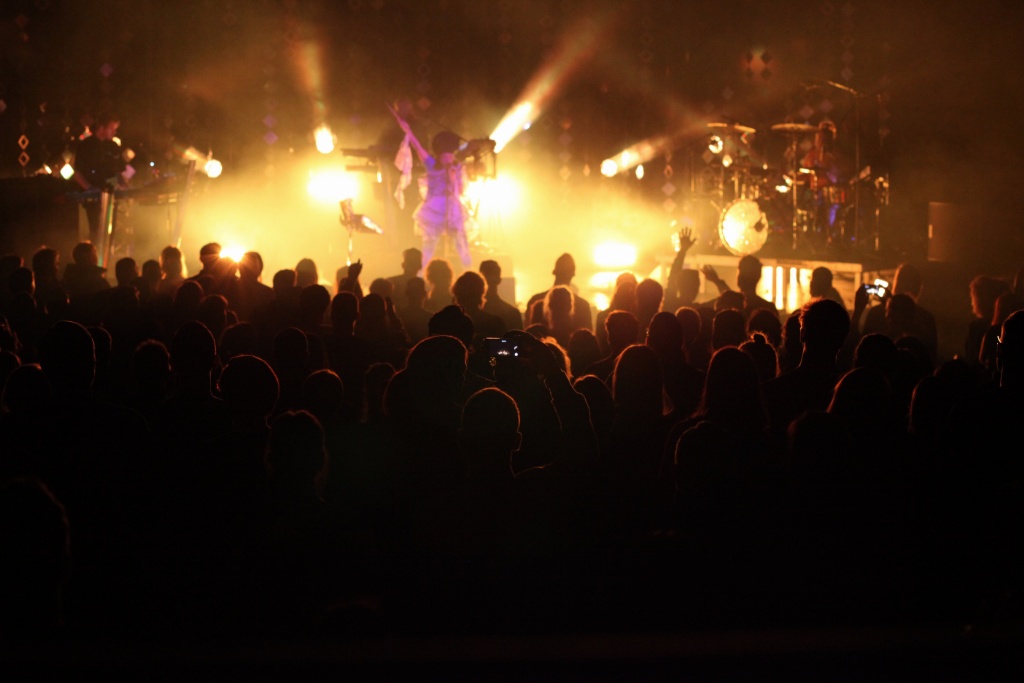
Little Dragon performing at the Capitol Theater. Photo by Felix Weichelt.
Likewise, prior to its official opening New Fall accompanies its visitors when they walk through the city. This year, the festival succeeded to implement their core idea of housing pop concerts at exclusive locations into advertising. In spite of classical ads, various columns at central metro stations like the Heinrich-Heine-Allee were decorated with the festival’s autumnal, colourful corporate design. Passing by this particular distinctive eye catcher every now and then, we found people stop and stare, smiling, following the leaves applied to the metro’s wall. Once a year, New Fall is all around town. It seems and feels familar. And that is what makes the festival special: the atmosphere it spreads.
For this year’s edition, we decided to concentrate on the festival’s locations, spotting what is going on off as well as onstage, eventually feeling immersed and part of the crowd. These are the impressions that we came home with.
Mogli & Alice Phoebe Lou at the Johanneskirche, Nov. 16-17
Right in the heart of the city resides what is doubtlessly one of Düsseldorf’s most beautiful churches, namely the Johanneskirche, a Protestant church bordering on the Schadow-Arkaden. Being of elegant stature from the outside, its interior is marked by an exalted simplicity. Possibly not embodying the character one would expect, the venerable place of worship is anything but blatantly pompous.
Quite fittingly, this year’s concerts at the Johanneskirche supported its modest, yet expressive character. The first two nights of the festival saw moving performances of two women that came closest to what we would call acoustic sessions. On an early Thursday evening, Mogli and her band were welcomed by a large crowd in an almost sold out church. One night and this time palpably later, that is one hour before midnight, a visibly younger and considerably smaller audience worshipped a tender performance of Alice Phoebe Lou. From the very beginning at both shows it has been amazing to trace how artists and visitors alike demonstrated respect for the environment. Whenever Mogli or Alice Phoebe Lou decided to turn towards the audience, they paused for a brief moment as if a period of reflection would set in and only then, after lowering their voice, they started to speak.
The audience, on the other hand, also took their time to arrange themselves for each gig. The full house at Mogli’s concert required improvisation and so, in order to be able to see what is going on onstage, some of the visitors upstairs started to climb up and stand on the church’s benches. It is something you possibly will never see again at this place and when some people started to look at them, a mixture of sly smiles and honest uncertainty met their eyes. In the end, most people collectively stood up and followed Mogli’s tales of her travels. The audience at Alice Phoebe Lou’s gig, however, pursued a different strategy. When a couple of girls moved to the front and started to sit down on the rather cold ground of the church, more and more people followed the idea and joined in. That night, it has been the music of Alice that warmed their bodies and hearts.
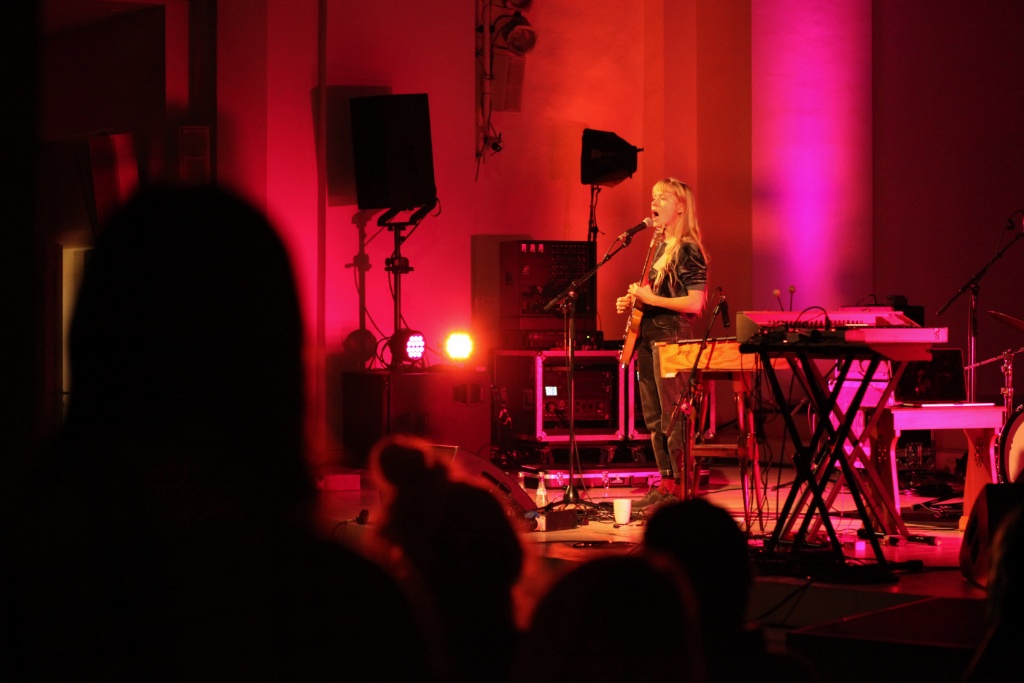
Alice Phoebe Lou live at the Johanneskirche. Photo by Felix Weichelt.
Little Dragon at the Capitol Theater, Nov. 16
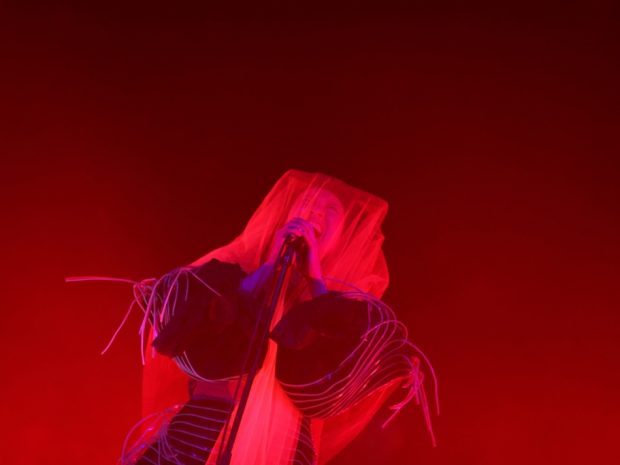
A powerful performance: Little Dragon. Photo by Felix Weichelt.
The Capitol Theater near Düsseldorf main station is the city’s biggest theatre. Made of flamboyantly red bricks and equipped with a range of generous windows that allow to have its lounge flooded with light, there is no way to escape or lose touch with the outside. The main theatre, on the other hand, sets a different tone to the spatiality. The all-blue seats convey a sense of autumnal melancholy, staying irrevocably where they once have been installed.
If there is one thing you might be able to learn at the New Fall Festival, then it is that transformations are taking place. In case of Little Dragon’s appearance which set the tone for a week full of great performances ahead, the band succeeded to turn the theatre into a night club, an inner sanctum and safe space for people of all kinds who came to fulfil only one duty: dance, celebrate music, and feel connected in some way. This attitude made almost everyone get up off their seats and move forward to form an imaginative dancefloor front-of-stage. Unsurprisingly, even the photographers wanted to become part of the crowd and joined the dancing lot. The positive vibes coming from the extravagant Swedish synth pop band made us realise one of their multiple strengths, namely how easily accessible their music and show are without making it look facile. Still, it made us wonder whether their allegedly (but truly) infectious carefree behaviour on stage is sort of conducted by pure spontaneity or possibly at least in parts a tool of artistic device. During their show, Little Dragon exposed themselves as pop intelligentia when they incorporated the beats of Kraftwerk’s Trans Europa Express in one of their own songs – an intertextual reference that found appreciation by an inaugurated and cheering crowd. That night, Little Dragon strengthened their bonding with the home and birth place of modern electronic music.
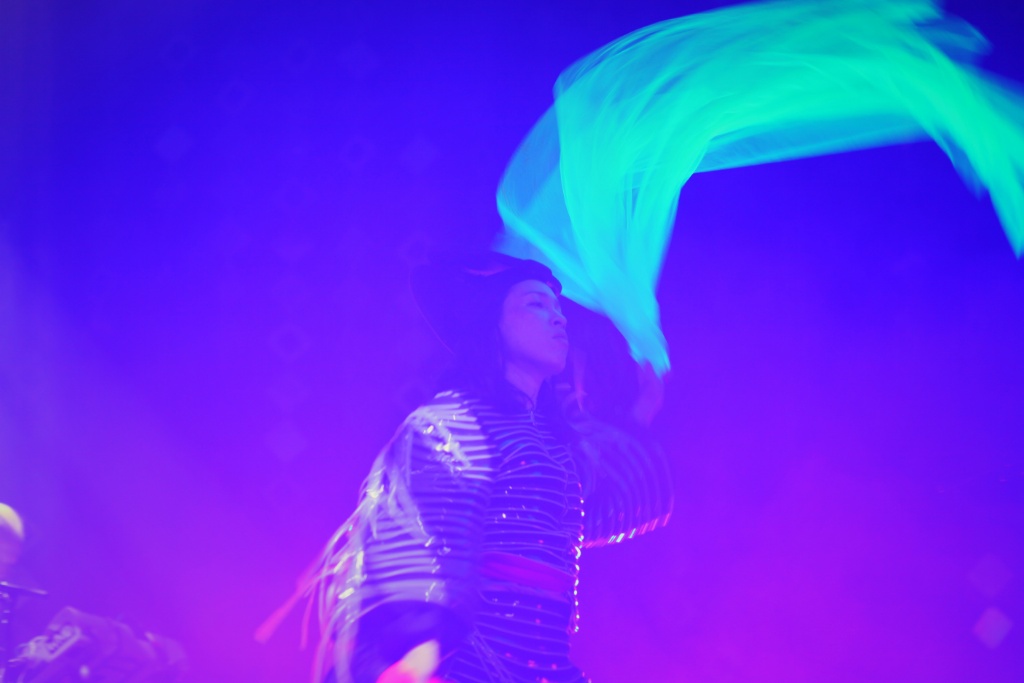
Yukimi Nagano in action. Photo by Felix Weichelt.
Julien Baker, Sophia & Thurston Moore at the Bachsaal, Nov. 16-18
In an upper part of the Johanneskirche, practically hidden from the public, there lies a shimmering piece of the church’s jewellery, a mysterious artefact of history: the Bachsaal, a small theatre-like hall with a ground floor and a balcony that allows to settle oneself on brownish wooden seat rows much too confined for these days, yet appealing enough to spurn having a seat.
If anything, the three concerts housed in the Bachsaal were testament to the line-up’s diversity. Then again, the order of the events from Thursday to Saturday could not have been more appropriate. Taken as a whole, the subsequent evenings appeared as a drama consisting of three acts. Julien Baker impersonated the calm before the storm and introduced to the fragility of all things while Sophia’s atmospheric performance embodied the wide array of emotions intertwined with the complexity of human existence. In then end, everything got smashed down by a beautifully destructive Thurston Moore who, thanks to the drama being a comedy, got us all out alive – and rather happy so.
On the first night addressed, an incredibly young looking Julien Baker stood alone onstage, equipped with a guitar and almost too shy to speak out to the audience. Baker’s concert at times appeared more like a lecture and the folks downstairs and above listened carefully to the words they got to hear. Barely anybody dared to speak and every time the singer finished a song, the crowd paused for a second, maybe doubting that this young woman could take an all to stormy reception. Nonetheless, she could and deserved so as she was applauded hevily. After the crowd had slowly left the hall, a clutch of empty wineglasses stood abandoned on the railing, crying to be refilled.

Julien Baker live at the Bachsaal. Photo by Felix Weichelt.

Empty wine glasses after Baker’s performance. Photo by Felix Weichelt.
Thankfully, one night later Sophia made us return to the Bachsaal. The beauty in Sophia’s music as well as in the band’s performance is to witness how Robin Proper-Sheppard’s oeuvre gradually changes, evolves and grows over time. Therefore, even considerably newer songs that have been released on his latest record As We make Our Way (Unknown Harbours) (2016) sound somewhat different and more elaborate. Evidently, one can hear and feel that Proper-Sheppard handles his back catalogue with care. That is no surprise, though, as the singer’s emotional performance unveils that he turns fundamental experiences and feelings into songs of melancholy beauty. A loyal fan base follows Proper-Sheppard and can relate to the emotional appeal of his vivid tracks. When Robin began to sing ‘It’s easy to be lonely’, a pregnant woman gently fondled her belly. Sometimes, we consciously choose (allegedly) rocky roads. With his music and words, Robin Proper-Sheppard reminds us that it is worth it.

Robin Proper-Sheppard playing the guitar. Photo by Felix Weichelt.
Still, sooner or later everything needs to come to an end. Thus, Thurston Moore played one final gig at the Bachsaal. Without any doubt, there is a certain destructive element in the man’s guitar-driven music as well as is in his rigid performance. Strangely enough, in this specific case that is a beautiful thing. Maybe it is because it has been pleasant to see how the former guitarist and singer of Sonic Youth stretches the pauses between the songs. For instance, when he puts away the guitar he just played, opens another guitar case he brings forth, takes the instrument out, carefully attaches the guitar straps and finally brings the case backstage before he returns in order to play another smashing track. These are not breaks. They are statements. Albeit, it has been even more pleasant to see fully-grown men jumping around crazy to Moore’s music as well as start shouting idolising phrases towards the musician. For one evening, reason and sanity are derailed.
Sudan Archives live at the me + all hotel, Nov. 17
The me + all hotel in Düsseldorf, opened only last year, is one of New Fall’s newest partners when it comes to invite artists to play at extraordinary places. In case of me + all, the musicians are invited to have their respective concert situated at the exquisite bar + lounge on the eleventh floor of the hotel. The neatly arranged lounge offers just enough space to have their guests sit or either stand in front of a specially established corner where since last year two gigs take place. Moving around in warm and hazy light, hotel guests and festival visitors alike enjoy the performances as much as the view over the city.
Indeed, the performances scheduled at the me + all hotel are the place where festival attendees, regular hotel guests, and even artists meet and merge. It very quickly came to light that the nightly concerts serve as an instrument to realise one of New Fall’s main ideas, namely bringing together different people at special locations in order to be part of extraordinary musical events. Arriving at the hotel, we suddenly felt that right here this approach is accomplished in the most natural way possible: When we were waiting for the lift to take us up to the bar, the band Sophia simultaneously checked in carrying with them suitcases and a net of fresh oranges. By entering the lounge, festival visitors come across hotel guests that are having dinner and drinks. Glances and smiles are exchanged and spatial as well as social borders are conquered. Later, Robin Proper-Sheppard and his band would turn up and take notice of Sudan Archives who in this relieved atmosphere breaks the fourth wall while playing the violin. Likewise, heavy beats produced by a flamboyantly looking Brittney Denise are filling up the room when behind our backs Proper-Sheppard appears, remarking ‘She’s a bit crazy, isn’t she?’ in a nonchalant way so typical for the now Berlin-based musician. It is all a bit crazy, I instantly come to think, as one will never experience such a multidimensional gathering at any other festival.
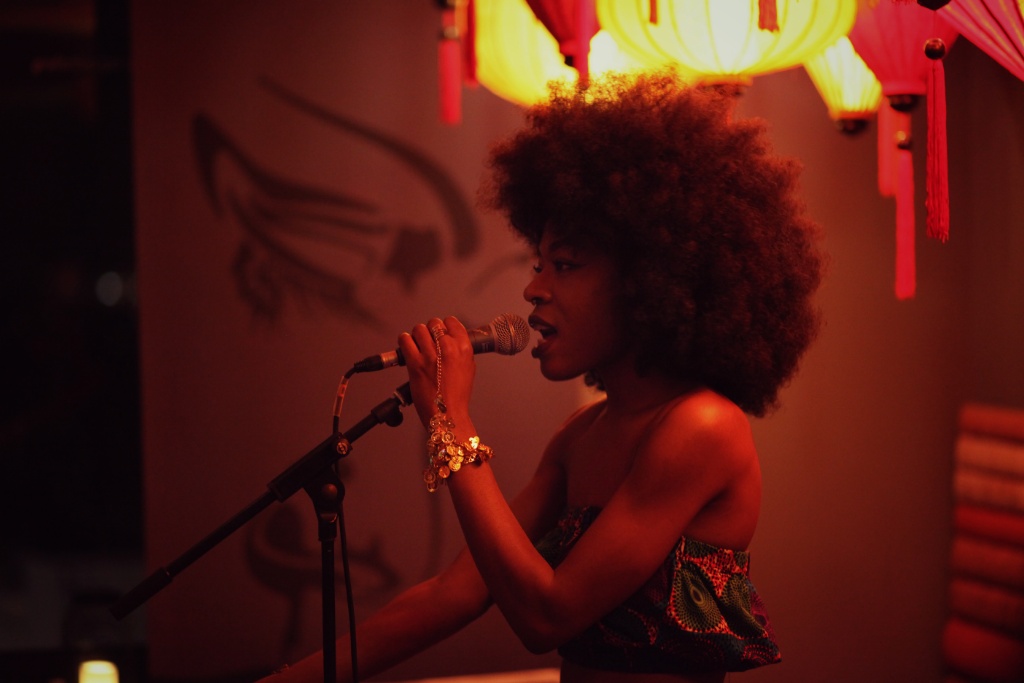
Sudan Archives live at the me + all hotel. Photo by Felix Weichelt.

Brittney Denise Parks playing the violin. Photo by Felix Weichelt.
Xul Zolar & Anna Ternheim at the Tanzhaus NRW, Nov. 18-19
The Tanzhaus NRW is a conceptual building founded in 1998 usually dedicated to the production and presentation of dance. Its main hall spreads a somewhat rustic charm. Whereas the greyish brick wall surrounding the stage, the parquet, and the rising seats are reminiscent of the honest and hard work that the art of dancing implies for the most part, its light shimmering floor as well as the mixture of red and dark seats, on the other hand, embody the glorious character that the dance unfolds when put into practice. In this ambiguous atmosphere, a handful of performing newcomers from North-Rhine Westphalia feel what it’s like to receive appreciative and warm applause after having made their first steps of a hopefully long enduring career. A day later, the majestic Anna Ternheim concludes the festival.
The large and clear stage of the Tanzhaus NRW, perfectly to be seen from every inch of the hall, could not have been shared by acts more contrary that weekend. On Saturday, popNRW resided at the Tanzhaus and brought us young and promising acts such as Xul Zolar. When Xul Zolar entered the broad stage, you could tell that they obviously felt at home in spite of usually being used to playing much smaller venues. Gladly, they did not perform any different, though. It is only that they had much more space to interact. This happened mainly throughout the music as they played a selection of new tracks that will see the light of day in January 2018 as part of their debut album Fear Talk. The band from Cologne proved that they almost effortlessly master the interplay between fragile vocals, the application of trenchant guitar play and minimalist synths as well as powerful and propelling drums and bass play. Xul Zolar’s performance has been enchanting, the music has been floating to the audience who closed their eyes and carefully moved their bodies along to the dreamy beats. The fact that the Tanzhaus NRW felt a bit empty due to it not being sold out did not matter, the spaces in-between were filled by the music.
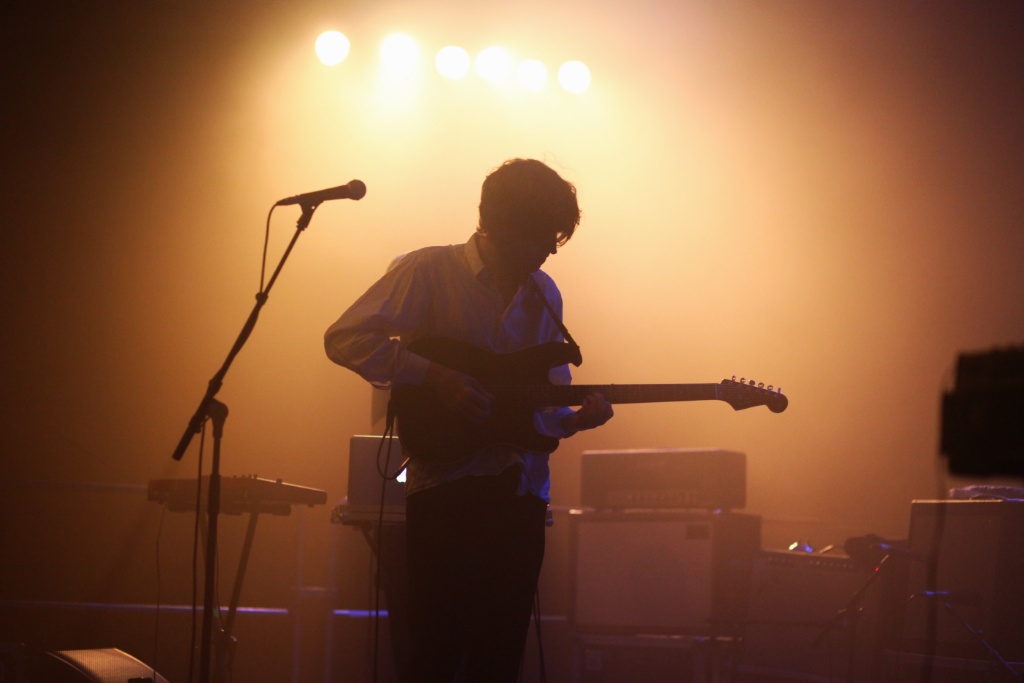
Ronald Röttel of Xul Zolar. Photo by Felix Weichelt.
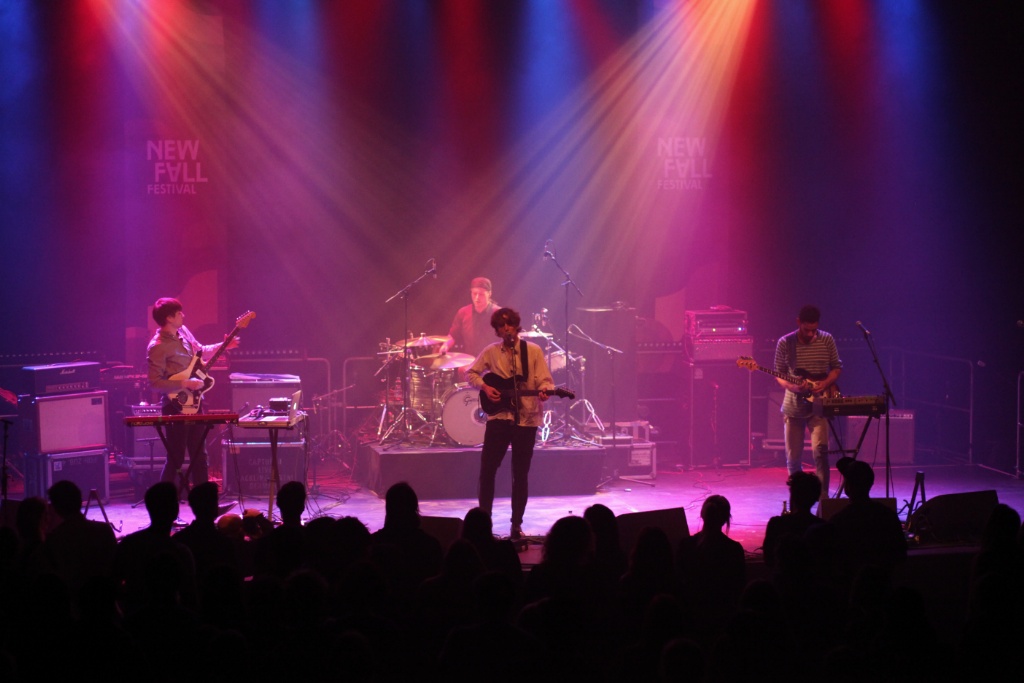
Xul Zolar live at the Tanzhaus NRW. Photo by Felix Weichelt.
One night later, however, the Tanzhaus turned out to be fully packed and Anna Ternheim and her piano player brought the New Fall Festival to a glorious end. Although all seats were taken and numerous attendees were standing densely side by side, the artist managed to let her gig look like a cosy and intimate house concert. She wandered between lampions and lanterns, carpets and instruments and kindly talked to the audience. The sovereign musician is best, though, when things are seemingly getting out of hand or, in other words, when unforeseen incidents intertwine with her self-confident role as a pop star. Moments like when she stops playing and announces that her piano player now takes over for a few minutes in order to perform a beautiful instrumental. Then she stands aside, becomes part of the crowd and watches the performance herself and just smiles. Moments all too human like when she stumbles to announce that her partner also has a record out but they alltogether for whatever reason failed to bring it along. And moments of spontaneity like when a voice from the audience shouts ‘Springsteen’, then formulates a concrete wish and Ternheim subsequently picks up her guitar and plays what is requested. In the end, the whole crowd was loudly stomping with their feet, unwillingly of letting Anna Ternheim leave the stage.

Anna Ternheim live at the Tanzhaus NRW. Photo by Felix Weichelt.
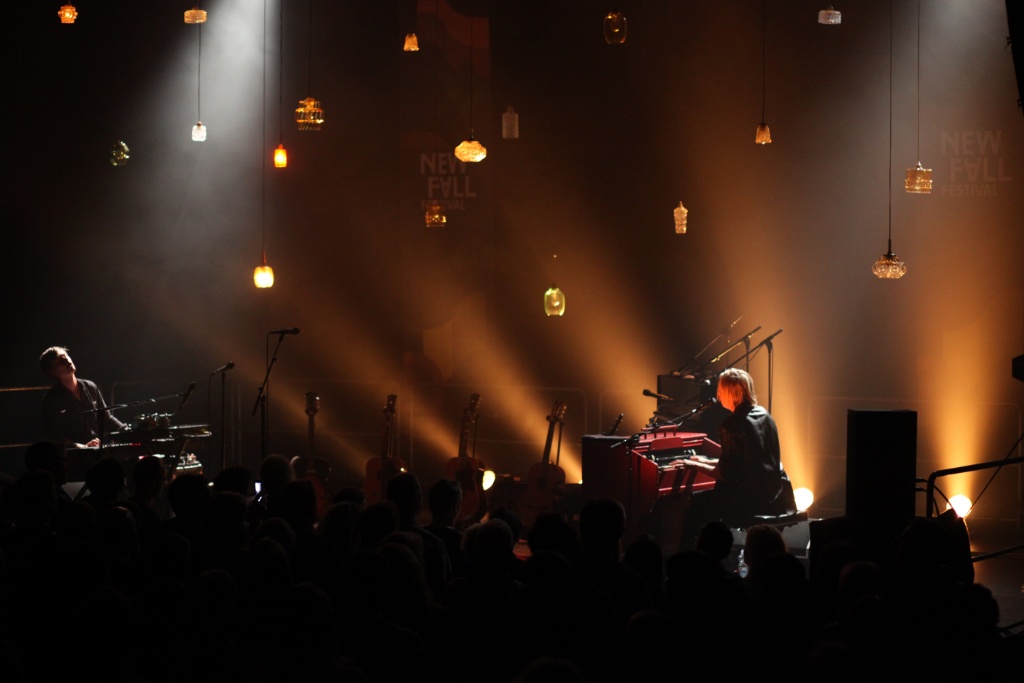
Ternheim playing the piano. Photo by Felix Weichelt.
Destroyer live at the Capitol Club, Nov. 19

Destroyer live at the Capitol Club. Photo by Felix Weichelt.
The Capitol Club as part of the Capitol Theater is one of the most charming locations in Düsseldorf. Creating the impression of being arisen from a Wes Anderson movie, the club part of the theatre welcomes you with round tables and flowers on its left and right wings, large reflective mirrors on each wall and a fitting disco ball hanging from the ceiling. This club is where spending an evening for extraordinary performances truly makes sense. By entering the filmic scenery, you almost get the impression of time travelling back to the 1920s where smoking men in suits and women in going-out dresses will be begging you for a dance.
In this vivid atmosphere, we witnessed one of the festival’s two concluding performances and a true highlight so to speak, namely the appearance of Destroyer. Contrary to the movement that the club implies, singer Dan Bejar stood almost rigid onstage, had not there been the microphone stand that he used to tiptoe around for a bit, every now and then. Behind Bejar, though, a clearly eupeptic band played irritatingly energetic along to the singer’s never changing boyish, at times vulnerable vocal performance that as a whole made us feel as if we were part of a Woody Allen movie. The big band and jazz feel to the instrumental part of the concert unmistakably brought forth the vitality that the room suggested and made us note that in Destroyer’s performance there is probably more said throughout the musical performance than expected in the first place. Whenever a song ended, it felt like a cigarette burnt-out and Bejar kneeled down, took a nip of his beer and gazed towards a red-wine nipping audience that, in return, stood up applauding. A shared respect between artist and audience filled up the air of the beloved Capitol Club. Indeed, there could not have been a more melancholic, yet rewarding performance to end this year’s New Fall Festival.

The audience watching Destroyer’s performance. Photo by Felix Weichelt.

Dan Bejar kneeling down. Photo by Felix Weichelt.
All photos by Felix Weichelt for NOTHING BUT HOPE AND PASSION.


